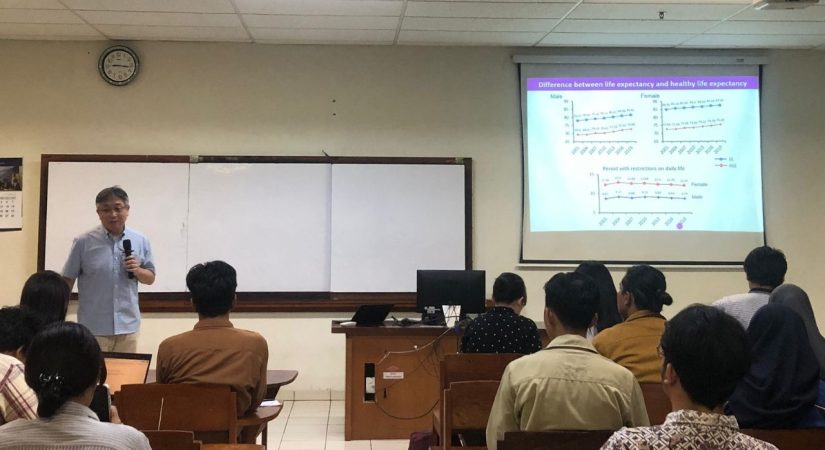
On September 3-4, 2024, the Department of Food and Agricultural Technology had the opportunity to host a guest lecture by Professor Hitoshi Shirakawa from Tohoku University. This event was part of the Kampus Merdeka Competition Program (PKKM) and was attended by undergraduate students taking Nutrition Science courses. In this lecture, Prof. Shirakawa presented two topics from his research: ‘Fermented Rice Bran and Its Ingredients for the Prevention of Lifestyle-Related Diseases’ and ‘Emerging Novel Functions of Vitamins for Healthy Life Expectancy.’
On the first day, Prof. Shirakawa discussed Fermented Rice Bran (FRB). Rice bran is a byproduct of the rice milling process, consisting of rice husks or the outer layer of the rice grain. Japan is one of the largest rice producers in the world, and from all the rice produced, 8% of it is rice bran. In Japan, rice bran is commonly processed into rice bran oil (37.5%), used in mushroom cultivation (9.5%), livestock feed (7%), and the remaining 46% is utilized to extract active compounds such as γ-Oryzanol, ferulic acid, and tocotrienol.
To enhance the benefits of rice bran, Prof. Shirakawa and his team developed Fermented Rice Bran, which is produced through a two-stage fermentation process using fungi and lactic acid bacteria. He explained that Fermented Rice Bran has a higher nutritional value than non-fermented Rice Bran. Based on his research, the benefits of fermented rice bran include lowering blood pressure, improving lipid metabolism, and increasing insulin resistance. This research successfully enhanced the benefit of rice bran and reducing food waste. However, this research has only been conducted on animal models so far.
On the second day, the topic was vitamins, particularly biotin and vitamin K. Biotin is a water-soluble vitamin found in liver, soybeans, eggs, yoghurt, milk, salmon, spinach, herring, tomatoes, and more. The benefits of biotin include reducing the risk of diabetes, acting as an antihypertensive, and mitigating the effects of declining testosterone production. In addition, the guest lecture also discussed the importance of vitamin K. Based on Prof. Shirakawa’s research, vitamin K has been shown to have benefits similar to biotin, including reducing the risk of diabetes and the effects of decreased testosterone production. Furthermore, vitamin K can reduce the effects of cholestasis, a liver disease caused by blocked bile flow, and also serves as an anti-dementia agent. However, like the research on Fermented Rice Bran, this study has only been conducted on animal models.
This guest lecture highlighted the importance of innovation in applying the principles of recycling and reusing food materials, which contributes to reducing food production waste and supports SDG 12 (Responsible Consumption and Production). Optimizing resource use and reducing environmental impact can create a sustainable food system. Moreover, developing nutrition research is crucial for improving quality of life, offering significant health benefits, and supporting SDG 3 (Good Health and Well-being). The synergy between these two aspects allows us to create a healthier and more sustainable society while having a positive impact on the environment.
Author: Firstnandita Keisha
